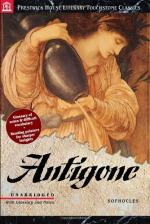|
|
Antigone Topic Tracking: Death
Death 1: Antigone's family is filled with death. Her father Oedipus killed his father Laius, Oedipus died in exile after wandering for many years, her mother Iocasta commited suicide, and now her brothers Eteocles and Polyneices are died as well. Antigone wants Polyneices to have a peaceful death by giving his body a proper burial, so that his spirit is not unhappy.
Death 2: The punishment for burying Polyneices' body is death by public stoning. Ismene is afraid that her sister Antigone will die too if she buries Polyneices against the wishes of Creon. She does not want to be the only person in her entire family who is left alive, so she begs Antigone not to violate Creon's decree.
Death 3: Creon arrests Antigone because she tried to bury her brother Polyneices against his wishes. When the Sentry dusts off the dead body, Antigone becomes enraged and runs forward quickly to protect it from being disturbed by anyone. She acts as if she is a mother and the dead body of her brother is her child.
Death 4: Antigone declares that Creon can only make laws about the city he rules. Death is something that the gods are in charge of, and the laws about burial for people who have died are timeless because the gods are immortal. Creon does not have the power to make laws denying burial, because he is breaking the god's laws. A spirit cannot rest in peace until its body has been buried.
Death 5: Creon happily condemns Antigone to death because she dares to question his judgement. He says to her, "Go, then, to the world below and love your brothers," meaning that if she loves her brothers so much then she can go see them herself in the Underworld when she is executed.
Death 6: Ismene is afraid to live her life alone when Antigone dies. She claims that she helped her sister to bury Polyneices' body because she is a weak person and doesn't want to be lonely. If everyone else in her family is dead, then she would like to die as well, declaring, "What life can be mine without [Antigone]?"
Death 7: At first Creon plans to execute Ismene and Antigone both, although Ismene is clearly innocent of any crime. The Chorus reminds him of this and Creon quickly changes his mind, agreeing that Ismene can go free; Creon takes death very lightly as if it were not such a big deal. Earlier, he threatened to excecute Antigone right in front of Haemon without any thought to how cruel that would be. Antigone's execution will be carried out by starvation in a closed cave rather than by stoning, to avoid polluting the city with death.
Death 8: Antigone feels as if she is not yet dead or not yet alive, because she has been sentenced to die and therefore can no longer think of living, but she is not actually dead yet. She is obsessed with her own death and somewhat looks forward to it, is all-too willing to receive her punishment. Knowing that she will not marry Haemon in life, she notes that now she will marry the "Lord of Death," for Death will take her away when she dies.
Death 9: Looking forward to seeing other members of her family who have died once again such as her mother, father, and brothers, Antigone is eager for her own death. It was her love for her brother that caused her to bury his body, and now she will be allowed to see Polyneices again in the Underworld.
Death 10: Teiresias states that Creon has done the exact opposite of what he should have done: he kept a dead man, Polyneices, in the world of the living above the ground, and he has placed a living person, Antigone, beneath the ground where only those that are dead belong. This is a terrible mistake. Antigone's cave is called a "tomb," which is a special place where dead bodies are buried.
Death 11: When death did not involve him or his direct family, Creon was more than happy to execute people for crimes. Now, however, when it is his own son who has died, Creon is a broken man, just as Antigone had been after the deaths of her brothers. Death has finally affected Creon's life now as well.
Death 12: Stabbing himself with a sword, Haemon died while hugging the body of Antigone. They are called "the dead upon the dead," for it is Antigone's death caused Haemon to kill himself. Soon it shall be the dead upon the dead upon the dead, as Creon's wife Eurydice kills herself after hearing about her dead son Haemon.
Death 13: Like the family of Oedipus, Creon's family is now filled with death. Both of his sons are dead as well as his wife and niece Antigone. He feels the sadness that Antigone had once felt when she insisted on burying her dead brother's body; Creon could understand this anguish only by experiencing it for himself, since he showed no compassion when he initially condemned Antigone to die.
Death 14: As Antigone had once welcomed her own death because she was so upset after the deaths of her brothers, now Creon welcomes his own death and does not think at all of his responsibilities to rule Thebes. He calls death "that best of fates" because it is the only escape he can have for his guilt and suffering.




